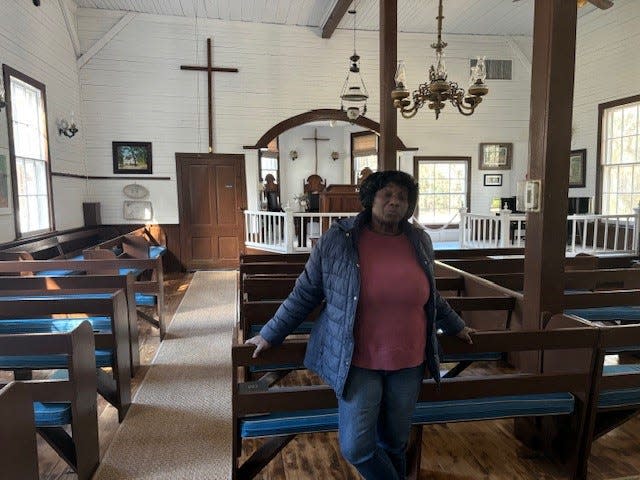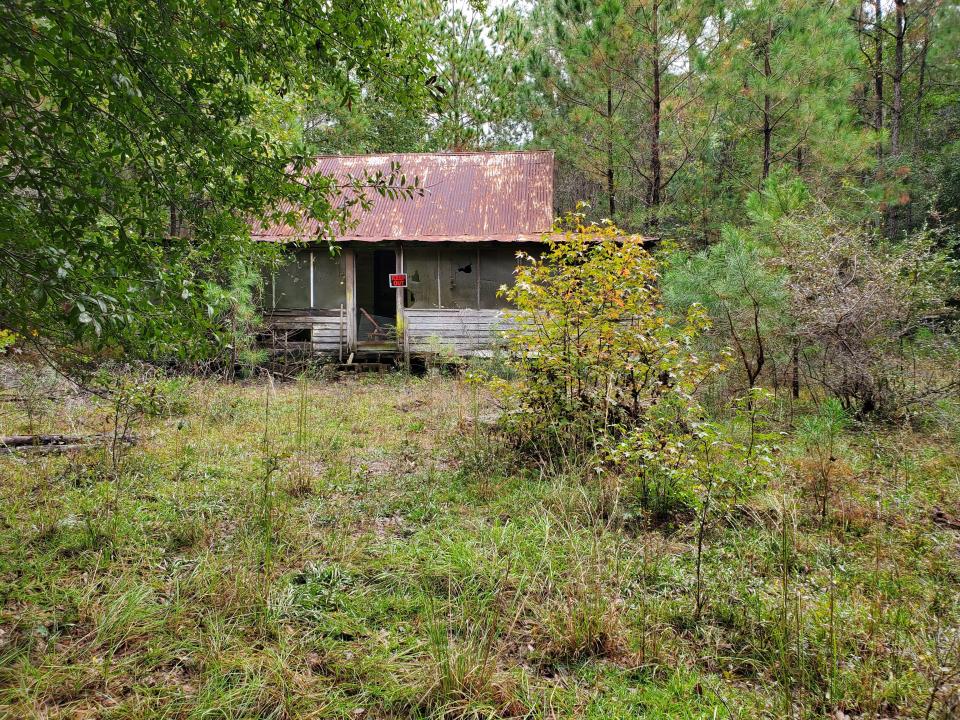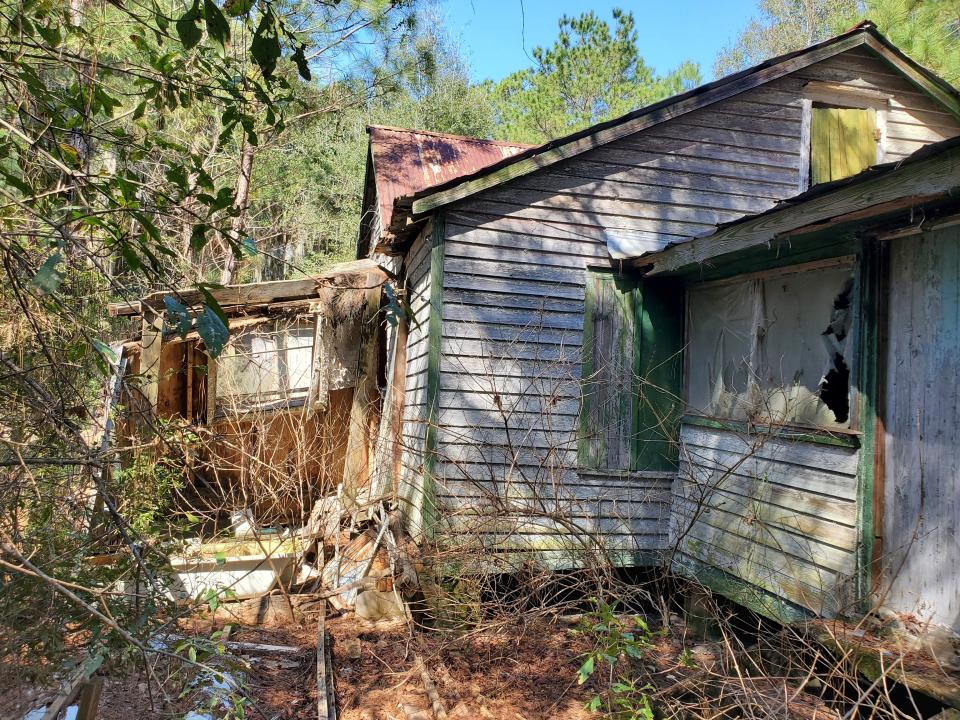Her childhood home has roots in the history of slavery. Now, she's fundraising to save it

Sallie Ann Robinson has distinct memories of every room in her childhood home on Daufuskie Island in South Carolina.
She can remember sleeping on the porch in the sun in the summertime, and the beautiful oak trees that used to take up space in the clearing where the house is. The kitchen was full of laughter and great conversations, and she was even born in one of the bedrooms, the only one of her siblings to be born there.
"I got so many stories I can tell you about this house ― lord, have mercy!" Robinson said. "But I want this house to be a memory for somebody else."
Robinson's house was built around the 1930s and started falling into its current state of disrepair in the last five years. As a sixth-generation Gullah Geechee born on Daufuskie, she's hoping to save, restore and preserve the house and the 10 or so other Gullah houses on the island through her tours on the island and a GoFundMe fundraiser. She believes her childhood home and the others are a part of the island's history.
Maxine L. Bryant: In search of Savannah's sacred Black burial grounds
Georgia county seeks to dismiss lawsuit by slave descendants over rezoning Sapelo Island homes

The Gullah Geechee people are descendants of Africans who were enslaved on the rice, indigo and Sea Island cotton plantations of the lower Atlantic coast, according to the Gullah Geechee Natural Heritage Corridor. After the Civil War, lands on the island were repossessed by original slave owning families and parts were sold to freed slaves returning to the area, giving rise to deep and rich Gullah roots that were able to survive and flourish with the self-sustaining power of relying on each other.
Robinson said she grew up with anywhere from 125 to 185 other Gullahs on the islands in the '60s, '70s and '80s, but at one point there were over a thousand.
Everyone gradually moved away for betterment in the mid-twentieth century. Oystering, farming and logging experienced an incredible decline with competing pricing, pollution and limited resources, leaving families to search elsewhere in search of work, according to Tour Daufuskie.
Now, about 15 of them remain full-time.
"You have to move, you know, and work to pay taxes to keep what you've got," Robinson said. "And come when you can visit, and that's how come these houses are falling apart, because a generation of kids leave to get jobs and they can't come back, supporting their livelihood. It's like oh my God, what can I do?"
Once her grandfather died at 96, she and her family stopped coming to the island as often. They were all busy, and Robinson herself was a nurse before becoming well-known for her status as a cookbook author, Gullah cultural historian and chef. She's also known for being the inspiration behind Ethel in Pat Conroy's 1972 memoir, The Water is Wide. She runs a tour company on the island now, where she speaks about her perspective as a Gullah growing up there.
She, too, lived in Savannah for over a decade before returning to the island in 2016. She wasn't planning on doing any of what she's doing now - the tours, the restorations, and cleaning up historical Gullah graveyards - but she says she gets this feeling in her inner spirit.
"I don't even understand why I get so involved in all of this without thinking about it," Robinson said. "But the spirit of my ancestors just come and talk to me and say Sallie, you can't just sit back and let these houses go away when these houses are the reason you are here."
Robinson was born in the house; her mother was born in the house and her grandmother. She also said that dislikes having to see folks come in and purchase land, some of it older buildings, fix it and maybe preserve some of their historical significance while others sit back and do "not a darn thing with the land that was given to us, literally given to us." Her mindset is: don't get mad, do something about it.
She started by clearing the land around her house of trash people had dumped there, and the pine trees that surrounded the house - she didn't want someone to accidentally start a fire. The house itself is still sturdy under her feet, built to last, but it's in disarray after years of neglect and people taking anything you could imagine out of it - chairs, a cookbook, a window. The bathroom that was added on to her mother's room in the 80s has fallen off. It needs some work, but Robinson has high hopes of what it could be.

She has raised $8,879 so far of her $150,000 goal on GoFundMe. Her ultimate goal at the end of the restoration is to turn it into an Airbnb. She wants each room to be named and designed after each one of her grandmothers' children, a garden out front, a bench remade in honor of her grandfather, who used to sit there and tell stories and watch them play.
Robinson wants to do a Airbnb instead of a museum, because there are already museums on Daufuskie.
"It'll be a fun place to come and appreciate the legacy of the family, and the family needs the money," Robinson said. "To keep the property."
She's starting with her house but hopes to also restore the other Gullah houses that are in similar states of disrepair. The first thing she wants to do is get an assessor who will tell her what it will actually take to restore the house, as $150,000 is just the starting point, but she knows it will take a lot more.
Yvonne Wilson has known Robinson her entire life. She wasn't born on Daufuskie but lived on the island from the ages of six to 14, when she had to leave due to lack of education opportunities, then moved back to the island in 1987, after marrying and having a couple of children. She said she hopes that if the houses are restored, more people would come back, preserving the culture of Gullah's on the island.
"I just hope and pray we can come up with some kind of idea to bring our people back here," Wilson said. "At one time the island was all Black, they had their own government, had their own church and school, and they all helped each other. It's something for other Black people to see, the achievements that Black people can make."
Robinson has fond memories of being raised on the island.
"It was a wonderful life, growing up here, even though we didn't know it," Robinson said. "People come back because they were some of the best days they've ever lived, we weren't trouble, wasn't hungry, always had clothes on our backs and shoes on our feet. They had nothing compared to what we have today, but they did it and made it happen and didn't give up, and that history is something we can learn from."
Destini Ambus is the general assignment reporter for Chatham County municipalities for the Savannah Morning News. You can reach her at dambus@gannett.com
This article originally appeared on Savannah Morning News: Daufuskie Island home with Gullah Geechee roots needs saving

